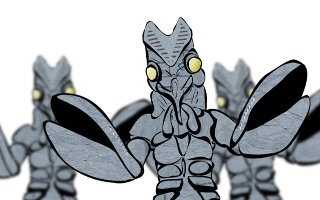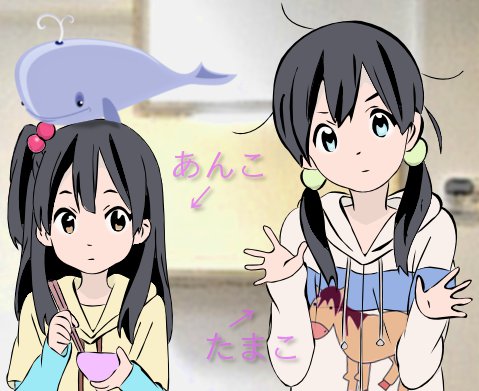第10回 : クジラはクジラでいいじゃなイカ(クジラ構文の後略)!
訳にこだわるのではなく、用法にこだわる。
Standard English
Fifty years ago there was a general, though vague, belief that it was the duty of grammarians to lay down rules for the correct use of the language, and the duty of everybody else to obey them. This belief has not entirely disappeared, but it is no longer respectable. Linguists now generally agree that "grammar is based on usage," and that a grammarian has no more right to say how people ought to talk than a chemist has to say how molecules ought to interact.
GUIDE TO AMERICAN ENGLISH L. M. Myers (一部省略しています)
【 単語・熟語 】
| vague | /veɪg/ | 【形容詞】 漠然とした,あいまいな |
| grammarian | /grəˈmɛər i ən/ | 【名詞】【可算名詞】 文法家,文法学者 |
| duty | /ˈdu ti, ˈdyu-/ | 【不可算名詞】 [具体的には 【可算名詞】] 義務 |
| lay down | 〈規則・原則などを〉規定する, 定める | |
| obey | /oʊˈbeɪ/ | 【動詞】 【他動詞】 従う,服従する. |
| entirely | /ɛnˈtaɪər li/ | 【副詞】 完全に.もっぱら |
| disappear | /ˌdɪs əˈpɪər/ | 【動詞】 【自動詞】 消滅する; 失踪する. |
| no longer | もはや~ではない(not any more, not…any longer) | |
| respectable | /rɪˈspɛk tə bəl/ | 【形容詞】 尊敬すべき, りっぱな |
| linguist | /ˈlɪŋ gwɪst/ | 【名詞】【可算名詞】 言語学者. |
| usage | /ˈyu sɪdʒ, -zɪdʒ/ | 【名詞】 慣習,慣行,慣例. |
| ought to | ~するべきだ | |
| chemist | /ˈkɛm ɪst/ | 【名詞】【可算名詞】 化学者. |
| molecule | /ˈmɒl əˌkyul/ | 【名詞】【可算名詞】 分子 |
| interact | /ˌɪn tərˈækt/ | 【自動詞】 相互作用する |
【 訳 】

50年前は、言語の正しい使用規則を定めることが文法学者の職務で、それに従うのは、他の者全員の義務だという大まかで曖昧模糊な信奉があった。
この信奉は完全に消え去ったわけではないが、もはや、まともなものではない。
「文法は慣例を基とする」もので、科学者に分子がどのように振る舞うべきかを語る権利がないように、文法学者にどう話すべきかを語る権利などない、ということを現在の言語学者は概ね認めている。
【 スラッシュ・リーディング 】
| Fifty years ago | / | 50年前は、 |
| there was a general, though vague, belief | / | 一般的だが、曖昧な信奉があった |
| that | / | that 以下の様な(信奉が) |
| it was the duty of grammarians | / | それこそが文法学者の義務だ(という信奉が) |
| to lay down rules | / | ルールを規定することこそが(文法学者の義務だという信奉が) |
| for the correct use of the language, | / | 言語の正しい使い方のルールを(規定するのは) |
| and the duty of everybody else | / | そして、他のみんなの義務である(という信奉があった) |
| to obey them. | / | それ(そのルールに)従うのは(義務であるという) |
| This belief has not entirely disappeared, | / | この信奉は完全に消滅したわけではない |
| but it is no longer respectable. | / | しかしながら、もはや遵奉するものではない。 |
| Linguists now generally agree | / | 昨今、言語学者は認めている |
| that | / | that 以下のことを |
| "grammar is based on usage," | / | 文法は慣例に基づく(ということを) |
| and that | / | そして that 以下のことも |
| a grammarian has no more right to say | / | 文法学者にはいう権利がない |
| how people ought to talk | / | 人がどのように話すべきか(という権利が) |
| than a chemist has to say | / | 科学者がいう権利がないのと同様に |
| how molecules ought to interact. | / | 分子がどのように振る舞うべきか(を言う権利がないのと同様に) |
Fifty years ago there was a general, though vague, belief that it was the duty of
grammarians to lay down rules for the correct use of the language, and the duty of everybody
else to obey them.
【 belief 】
believe(信じる)の名詞形なので「信じること」を基として、
何かを信じれば「信念、確信」
神や学説、主義・主張を信じれば「信仰、信奉」
人を信じて「信頼、信用」
と様々な意味に広がりを見せる単語です。
| belief in personal liberty | 個人の自由に対する信念 |
| belief in God | 神への信奉 |
| a child's belief in his parents | 親に対する子供の信頼 |
50年前の人々は「言語の正しい使用規則を定めるのは文法学者の責務で、それに従うのは、他の者全員の義務だ」という主義・主張を信じていたと説明しているので、 ここでは「信奉」としました。単に「信じていることがあった」でも、意味は通るので良いです。
beliefは 『第3回:結構勘違いしている、聖書のことを』では、 "Contrary to popular belief(一般に思われていることとは反対で)"という定番フレーズで登場しました。
(ex) Contrary to popular belief, the economy has actually improved in recent months.
(一般に思われていることとは逆で、景気は、ここ数ヶ月上向いている。)
【 duty 】
You are not to neglect your duty.
義務を怠ってはいけない。
I have a duty to ensure her wish is granted.
俺にはあいつの夢を叶えてやる義務がある。
| the duty of grammarians | 文法学者の職務 | |
| the duty of everybody else | 他の者達の義務 | |
| the duties of a teacher | 教師の職務. |
【 grammarian(s) 接尾辞” an / ian ” 】
grammar(文法)という単語に「人」を意味する接尾辞” an / ian ”をつけると、文法を研究する人という grammarian( 文法家,文法学者 )という名詞の出来上がり。
この要領で、politic( 政治上の )という単語に接尾辞” ian ”をつけると” politician ”。但し、 politic には「策を弄する」とか「ずるい」という意味もあるので訳語は
「政治屋」。日本で言えば…、おっと、これ以上書くと命を狙われそうだ。「政治家」は、statesman。その違いを、アメリカの神学者( theologian = theology + -an)で
著述家のジェームス・フリーマン・クラーク( James Freeman Clarke )氏は、
The difference between a politician and a statesman is that a politician thinks about the next election
while the statesman think about the next generation.
「政治屋と政治家の違いは、政治屋は次の選挙のことを考えるが政治家は次の世代のことを考える」
と、うまい具合に言い表している。まさに、そのとおりだ。日本で言えば政治屋は・・・、おっと、これ以上書くと命を狙われそうだ。

接尾辞” an / ian ”をつけると人になる…。だったら、バルタン星人はバルタン星に住む”人”だからBaltanian(バルタニアン)かな、と思ってググってみると ”Alien Baltan(エイリアン・バルタン)”だった。Baltanianの方がカッコ良いと思う。火星人は”Martian”なのだし…。
ついでながら、ウルトラマンは"Ultraman"で、偽ウルトラマンは"Imposter Ultraman"とか"Fake Ultraman"。
もっともっと、ついでなことを云うと、【アニメ】『交響詩篇エウレカセブン』にでてくる謎の少女エウレカは、「スカブ・コーラル(Scub Coral)」と呼ばれる惑星の生命体なので、 Coralians(コーラリアン)と表現されていました{Humanoid Coralians are beings born of the Scub Coral (Otherwise known as Coralians) in the form of humans.}( Eureka Seven Wiki)。
| grammarian | 文法家,文法学者 | politician | 政治屋 |
| theologian | 神学者 | Martian | 火星人 |
| Coralian | コーラリアン |

【 It is the duty of A to B~ BすることこそがAの義務だ 】
the duty となっているので、「それこそが」と強調されていることに注意。これが"It is a duty of A to B~"だと「BすることはAの義務 (のひとつ)だ」といった意味合いになります。
It is the duty of the patriot to protect his country from his government. --- Thomas Paine
政府から己の国を守ることが愛国者の勤めだ。 (※ トマス・ペインが本当にこの台詞を言ったのかは不明らしい。
It is the duty of a teacher in a public school to respect the rights of students
学校では生徒の権利を尊重してあげることが、教師の責務だ。
It is the duty of teachers to develop high morals and strong character in their students.
生徒の強い個性と高い道徳心を伸ばしてあげることが、教師の職務だ。
The dead cannot cry out for justice. It is a duty of the living to do so for them.”
―Lois McMaster Bujold
死者には正義を追求するすることはできません。彼らの代わりに、それをするのが生者の義務(のひとつなの)です。
It is a duty of man to cultivate his natural powers. --- Immanuel Kant
本来の能力の涵養は、人の義務(のひとつ)である
【 動詞+目的語の名詞化 changing verbs into nouns 】
It was the duty of grammarians to lay down rules for the correct use of the language.
| use the language correctly | => | the correct use of the language |
| worship nature 自然を崇拝する | => | the worship of nature |
| worship the devil 悪魔を崇拝する | => | the worship of the Devil |
| God created Adam and Eve 神がアダムとイヴを想像した | => | God's creation of Adam and Eve |
| investigate tutankhamun’s tomb ツタンカーメンの墓を調査する | => | investigation of tutankhamun’s tomb |
| love music 音楽が好き | => | love of music |
| annihilate humans 人類を殲滅する /ənάɪəlèɪt/ | => | annihilation of humans |
Vatican says 'Avatar' promotes `worship of nature' over religion. =>■
Freemasonry is a religion involved in the worship of the devil.
And human beings began at that time with God's creation of Adam and Eve. =>■
Iivestigation of tutankhamun’s tomb was a difficult task.
He has a love of music.
The almost certain predictable future if we do not do this is total annihilation of humans on this plant. =>■
【 lay down => ややこしい” lay ”と” lie ” 】
lay (/léɪ/) は「横たえる、置く」で lay (/lάɪ/) は「横たわる」と、「おざなり」と「なおざり」の違いのように難しい。そこで、昔、思いついた覚え方が
lay は” a ”があるから” レイ ”。lieは” i ”があるから” ライ ”
lay = 冷麺を「置く」 lie = ライオンが草原に「横たわる」
でも、今でもやっぱりややこしい。
This belief has not entirely disappeared, but it is no longer respectable.
【 no longer もはや~ではない 】
I'm no longer who I used to be.
もう、あの頃の僕じゃない
This planet became a place where people could no longer live.
この惑星は人の住めない星となってしまった。
Pixar and Disney are stale and no longer make good movies like they used to.
ピクサーとディズニーはくっだらない。この先いい映画は作らないよ、以前のような。
He no longer smokes.
もうタバコは吸っていない。
The building no longer exists. It was torn down.
あのビルはもうない。取り壊されたんだ
Dinosaurs no longer exists. They're extinct.
ディノサウルスはもう存在していない。絶滅しました。
The samurai no longer exists
侍は今はいません。
When we are no longer able to change a situation, we are challenged to change ourselves.
--- Viktor E. Frankl, Man's Search for Meaning
ある状況を変えることができない時というのは、私たち自身が変わることを要求されている時なのです。
Linguists now generally agree that "grammar is based on usage," and that a grammarian has no more right to
say how people ought to talk than a chemist has to say how molecules ought to interact.
【 クジラ構文は、ひっくり返して訳す 】

A whale is no more a fish than a horse is.
「馬が魚でないのと同様に、クジラは魚ではない」
初めてこの文と遭遇した時「当たり前だ。なんてマヌケな例題なんだ」と思った。けれども、この文章の記憶定着率はピカイチで、 未だにいつでも思い出せるということは、例文としては非情に優れていると言えるのではないだろうか、とこの頃は思います (ただ、馬が魚でないことがクジラが魚でないという理由にはならないので、言っている内容は論点先取以下のように思います)。
所謂クジラ構文と呼ばれる例文には、御多分にもれず、多くの人と同様「than以下が肯定文なのに何で否定的に訳すことができるのだろう?」と、 ボクも悩まされました。だって、素直に読めば「馬が魚であるより、クジラは全然、魚じゃない」といった感じにしか読めないからです。
が、しかし…。
ある時、thanが接続詞だと知った途端、すんなりスッキリとthan以下を否定的に訳すわけに合点がいきました。
つまり、この no more A than B は not either A or B や neither A nor B の否定の仕方と同じなのです。どちらも、or(もしくは、nor)という 接続詞(conjunction)で繋がれたAとBの両方をnot either(もしくはniether)が否定(-)するように no more A than B も thanという接続詞でつないだA節とB節の両節をmoreではない (no)と否定(-)しているだけなのです。記述は正しくありませんが算数的に書くと下記のようになります (但し、この解釈はthanが接続詞として使用されている場合で、前置詞として使用されると、意味が変わります:後述)。
| not either ( A or B ) | = | -( A + B ) = [ ( -A ) + ( -B ) ] |
| neither ( A nor B ) | = | -( A + B ) = [ ( -A ) + ( -B ) ] |
| no more ( A than B ) | = | -( A + B ) = [ ( -A ) + ( -B ) ] |
というわけで、学生の時に習った、あの懐かしい例文の意味は
A whale is no more a fish than a horse is.
(クジラは魚ではない + 比較の打ち消し + 馬もそうではない)
となり、突拍子もない否定例を従属節B[=Subordinate (or Dependent) Clause]に示して、 Aのある主節[=Main (or Independent) Clause]の否定理由を説明します。 それから、最後に残った比較の接続詞もひっくり返って「~と同様に」となり、
「馬が魚でないのと同様に、クジラは魚ではない」
となります。
なぜ、こういった節と接続詞の意味の反転現象が起こるのかという説明は、” not either A or B”と”neither A nor B”の"or"や "and"で繋がれた文を否定した際の意味変化を理解しておいたほうが判りやすので、先に、そちらから見て行きましょう。まずは、 ” not either A or B”と”neither A nor B”の説明から。どちらも「AもBも~でない」といった意味になります。肯定形は、 either A or B で「AかBのどちらか」といったニュアンス。ヘレン・ケラーは、
Life is either a daring adventure or nothing at all. --- Helen Keller, The Open Door
人生は、あえて事を起こすか全く何もしないかのどちらかです。
という素敵な言葉を後進に残しています。『クレイマー、クレイマー』という映画では
All my life I've either been somebody's daughter or somebody's wife, or somebody else's mother...
今までの人生、私は誰かの娘であり、妻であり、母でした。
と「A または B もしくは C 」という使い方がされていました。これが否定になると「A または B ではない」とはならず、先に述べた通り「AもBも~でない」と両否定になります ↓
Tamako doesn't like either apples or oranges.
= Tamako likes neither apples nor oranges.
= たまこは、リンゴもミカンも好きではありません。
実は上の文、”Tamako doesn't like apples or oranges.”といっても同じ意味になります。というか、会話ではこちらの方が自然です。 "not either A or B"の使用は「助長だ」とか「ぎこちない」などと言われます(文章ではOk)。「拙者、明日、学校に行くでござる」という表現が、意味はわかるけど、変だよ、というのと同じです (ちょっと、違うか)。かたや、"neither A nor B"はフォーマルに響きます。
どちらも嫌いだと言っているのに”or”を使うなんて、なんだか変な感じがします。ならば”and”を使って "Tamako doesn't like apples and oranges"としたら、どうなるのかというと、
| not ( A and B ) = [ (-A) + B ] or [ A + (-B) ] |
| AとBが好きというわけではない |
と「たまこは、リンゴかミカンのどちらかが好きではない(さァ、どっちでしょう? 答えは、お餅!)」といったナゾナゾ (riddle)みたいな、もしくは「リンゴと一緒にあるミカンが好きじゃない」というような意味にとられてしまい、ぎこちない文章になってしまいます。
なかなか厄介な関係ですが、それが英語のロジック。覚える他ありません。とはいえ、この理屈を解決する日本語が、実はあります。それは「どちら」です。
"and"は「どちらも」、"or"は「どちらか」と訳せるので、
"A and B(A、B、どちらも)"が否定された時は"A or B(AかBのどちらか)"になり、
"A or B(AかBのどちらか)"が否定された時は"A and B(A、B、どちらも)"になる、
と覚えておくのもひとつの手です。
故に先の"Tamako doesn't like apples and oranges"は「たまこはリンゴとミカンのどちらも好きというわけではない => 「リンゴかミカンのどちらかが好きだ」ということを言っていたことになります。このロジックを使用した諺に、
You cannot have your cake and eat it
というのがあります。notで否定されたA and B なので”ケーキは持つか、食べるかのどちらかだよ”といったことを表しています。
こういったわけで、「AとBの両方を否定する際の接続詞は”or”を使用するようになっている」のです(慣例)。日本語で考えると「Aか Bか」とか「AもしくはB」といった内容が否定されたにもかかわらず、です。しかし、そういった日本語の解釈など、英語を母国語として話している人には関係ありません。
同じように、節を比較して否定する際は”no more”と接続詞の”than”を使用する ことになっています(慣例)。ですから「へっ! thanは『~よりも』ではないの?」といった疑問を日本人が抱こうが抱くまいが、これまたネイティブには関係ないのです。つまり、 than は
than = 「~よりも」
などではなく(than ≠「~よりも」)、日本人が意味の解釈上、単に「~より」といった語が分かりやすいから当てているだけの話に過ぎません。
than≒「~よりも」 = "Than" is almost equal to "~よりも"
ですから「Bと比べれば」とか「Bに対して」といった、それらしい日本語なら、なんでもいいわけです(現に "different than"の than には「~とは違って」みたいな日本語が当てられています)。といったわけで、 ”no more A than B”の"than B"という比較箇所は 比較の意味もひっくり返って「同様に」という意味合いになる為、「Bがそうでないように」といった、それらしい言葉を当てます。よって、
no more A than B ≒ Aなどではない/Bがそうでないように
と、A節、B節そしてthanをひっくり返して訳すことになるわけです。
では、この辺を踏まえてクジラ構文の例を見ていくことにしましょう。まずは本文から…。
A grammarian has no more right to say how people ought to talk
than a chemist has to say how molecules ought to interact.
文法学者には人がどのように話すべきか、という権利などない /
科学者に分子がどのように振る舞うべきかを言う権利がないように
(科学者に分子がどのように振る舞うべきかを語る権利がないように、文法学者にどう話すべきかを語る権利などない。)
ちなみに、この文での”a chemist has to say”は”a chemist has the right to say”です。
This is the point. One technology doesn't replace another, it complements. Books are no more threatened by
Kindle than stairs by elevators. --- Stephen Fry
ココがポイントだ。あるひとつの科学技術が他に取って代わるなんてことはない。補完するのだ。
書物はkindleに脅かされてなどない / 階段がエレベータに脅かされていないように
(書物がkindleに脅かされているというのは、階段がエレベータに脅かされているというようなもので、馬鹿げている)。
Computer science is no more about computers than astronomy is about telescopes. --- Edsger W. Dijkstra
コンピュータ・サイエンスはコンピュータに関する学問ではない /
天文学は望遠鏡に関するそれでないように
(コンピュータ・サイエンスとは、天文学が望遠鏡だけに関する学問ではないように、コンピュータについてだけを扱うものではない)。
A man has no more right to say an uncivil thing than to act one; no more right to say a rude thing
to another than to knock him down. --- Dr. Samuel Johnson.
(他者に対して)無礼な振る舞いをする権利を享有していないのと同様、人は無礼な口を利く権利など享有していない。噛み砕いて言えば、誰かを叩きのめす権利がないように、下品なことをいう権利などない、ということだ。
A man is born an artist as a hippopotamus is born a hippopotamus; and you can no more make yourself one
than you can make yourself a giraffe. --- John Ruskin
カバがカバとして生まれてくるように人は芸術家として生まれいずるのだ。かるが故に、人が芸術家になることができるなどというのは、キリンになれるというようなもので、馬鹿げている。
An alcoholic has no more control over alcohol consumption than a cancer patient has over the
growth of malignant cells.
がん患者が悪性細胞の成長を制御できないように、アルコール依存患者はアルコールの消費を制御できないものだ。
THE DISEASE CONCEPT Of Alcoholism and Other Drug Addiction
Needless to say, women are no more guided exclusively by intuition than men are by reason.
言うまでもなく、女性が直感だけに左右されているなどと言うことは、男性は理性のみに突き動かされているというようなもので、まったくもってあり得ないことだ。
I can no more help loving Collin than I can help the rain falling or the trees bursting into leaf.
私にはコリンを愛さずにいることなど出来やしない。雨を降らしたり木々を芽吹かせたりすることが出来ないのと同じことだ。
『翻訳英文法―訳し方のルール』 P133
オバマ大統領も第2期・大統領就任演説で次のようにクジラ構文を使用していました。
For the American people can no more meet the demands of today’s world by acting alone than American soldiers could
have met the forces of fascism or communism with muskets and militias.
というのも、マスケット銃と民兵ではアメリカ兵はファシズムや共産主義に対抗できなかったはずで、アメリカの人々の孤軍奮闘だけでは今日の世界の要望に応えることができなくなっているからだ
(アメリカ人の孤軍奮闘だけで今日の世界の要望に応えることができるなどというのは、マスケット銃と民兵でもアメリカ兵はファシズムや共産主義に対抗できただろうというようなものだからだ)。
マリファナの使用について意見を述べる際もオバマ大統領は次のように…。
Marijuana use is no more dangerous than alcohol.
マリファナ(の吸引)が危険でないのは、アルコール(飲酒)が危険でないよう…あれ? あれレレレ!?言っている意味はわかるのですが、今までは
B節に突拍子もないような文を持ってきてA節を否定していたのに、この文章は少し違います。「飲酒が危険でない」なんて当然ですし、良く見るとBは
"alcohol is"という節ではなく、名詞になっています。
色々と漁ってみると、次のような文章もありました
There is no more beautiful life than that of a student.
素晴らしい人生はない / 学生の生活が素晴らしくな…あれ? あれレレレ!?この文章は常識的に考えると「学生生活ほど素晴らしいものはない」と言いた気です。こちらは
than以下が"that of a student"と名詞句になっています。一体全体、これはどういうことなのでしょう?
来週のサザエさ… 次章につづく… ↓
【 than が前置詞として機能している場合( than + 目的格 )】
実は、先に但し書きで書いた「この解釈はthanが接続詞として使用されている場合で、前置詞として使用されると、意味が変わります」 にあたるのが上の2文で、"than"が前置詞として使用されているためです。つまり、用法が違うのです。それ故、 "than"以下が名詞もしくは 名詞句になっていたのです。この場合は、通常の比較分として訳せば Okです。第10回のサブタイトルを「訳にこだわるのではなく、用法にこだわる」としたのは、このためです。算数的には下記のようになります。
no more A than B = -A + B
先のオバマ大統領のマリファナ使用に関するコメントを改めて見てみましょう
President Obama says marijuana use is no more dangerous than alcohol,
though he regards it as a bad habit he hopes his children will avoid.
"As has been well documented, I smoked pot as a kid, and I view it as a bad habit and a vice, not very
different from the cigarettes that I smoked as a young person up through a big chunk of my adult life,"
he said in a magazine interview. "I don't think it is more dangerous than alcohol." ※1
オバマ大統領は、マリファナの使用は飲酒に比べ、危険ではない
(飲酒よりも安全だ)、と語っている。しかし、マリファナは悪い習慣なので、子どもたちには手を出してほしくないと願っている。
「あちこちで書かれている通り、私は子供の頃にマリファナを吸った。悪習で非行ではあるが、若いときに吸っていたタバコとあまり変わらない」と雑誌インタビューで答えた。「アルコールよりも危険だとは思わない」
| As has been well documented, | = | いろいろなところで書かれている通り |
There is no more beautiful life than that of a student.
学生生活ほど素晴らしいものはない
There is no more lovely, friendly and charming relationship, communion or company than
a good marriage. --- Martin Luther
良い結婚ほど、愛情に溢れ友好的で素敵な交わりはない。
There is no more final end than death. --- John Thaw
死以上の最後はない。
At present there is no more urgent and important task than solving the problem of food. ※2
現状、食料問題の解決以上に緊急かつ重要なことはない(食糧問題の解決が最優先だ)。
【 注 意 ! 】
ただ、比較級の"than"は、すべて「接続詞だ!」と主張する人がいるのも事実で、
He is taller than me.というのは、間違いで、元々はHe is tall. と I am tall. を比較してどちらが高いかを比べていたので、
He is taller than I (am).が正しい、
というのが言い分のようです。
う~む、元々はそういう流れで出来た表現なのかもしれませんが、では上のイラストの" たまこ "と" あんこ "の伸長を比較する場合は
Tamako is taller than Anko (is).
が正しくて、その大前提として"Tamako is tall." & "Anko is tall"だから、と言えるでしょうか?どう見たって" たまこ "の方が " あんこ "よりもはるかに背が高いです。何が言いたいのかといえば、元々の流れは置いといて、今現在、日本ではマチガイとの主張が多い "than me"といった言い方は、「彼のほうが私より(僅差で)大きい」などと言っているのではなく、素直に見た目で "大きい"と思っている表れが前置詞扱いされている理由ではないでしょうか?つまり、話者には"He is tall"という意識はあっても "I am tall"などという意識がないということです。そして、多くのネイティヴが"than me"を "compared to me"のように使用している昨今、それが 慣例となり、次第に文法的に正しい表現となってきているのではないでしょうか?
この件は、辞書を編集するする側もかなり意識しているようで、Merriam-Webster Dictionaryのサイトでは"than"を"conjunction(接続詞)",
"preposition(前置詞)"とし前置詞の説明欄には、『Usage』として次のように説明しています。
Some people consider the use of than as a preposition to be incorrect. It is very common, however,
especially in the phrase than me. ※3
thanを前置詞として使用することは間違いだ、と思う人もいる。しかし、こういった使い方は---特にthan meといった句は---かなり一般的である。
手持ちの"Collins COBUILD Advanced Learner's English Dictionary"は"than"を最初に"PREP(前置詞)"として挙げ、
You use than after a comparative adjective or adverb in order to link two parts of a comparison.
比較する2つの部分を繋げるために、比較級の形容詞や副詞の後にthanを使います。
と定義しています。
こういった流れこそが、まさしく言語学者の言う「文法は慣例を基とする(grammar is based on usage)」ということなのでしょう。といったわけで、 " たまこ "と" あんこ "の関係は
Tamako is taller than Anko.
なのです。
【 以上を踏まえて、再度、スラッシュ・リーディング! 】
| Fifty years ago | / | 50年前は、 |
| there was a general, though vague, belief | / | 一般的だが、曖昧な信奉があった |
| that | / | that 以下の様な(信奉が) |
| it was the duty of grammarians | / | それこそが文法学者の義務だ(という信奉が) |
| to lay down rules | / | ルールを規定することこそが(文法学者の義務だという信奉が) |
| for the correct use of the language, | / | 言語の正しい使い方のルールを(規定するのは) |
| and the duty of everybody else | / | そして、他のみんなの義務である(という信奉があった) |
| to obey them. | / | それ(そのルールに)従うのは(義務であるという) |
| This belief has not entirely disappeared, | / | この信奉は完全に消滅したわけではない |
| but it is no longer respectable. | / | しかしながら、もはや遵奉するものではない。 |
| Linguists now generally agree | / | 昨今、言語学者は認めている |
| that | / | that 以下のことを |
| "grammar is based on usage," | / | 文法は慣例に基づく(ということを) |
| and that | / | そして that 以下のことも |
| a grammarian has no more right to say | / | 文法学者にはいう権利がない |
| how people ought to talk | / | 人がどのように話すべきか(という権利が) |
| than a chemist has to say | / | 科学者がいう権利がないのと同様に |
| how molecules ought to interact. | / | 分子がどのように振る舞うべきか(を言う権利がないのと同様に) |
【 最後に原文を読んで完璧にする 】
Standard English
Fifty years ago there was a general, though vague, belief that it was the duty of grammarians to lay down rules for the correct use of the language, and the duty of everybody else to obey them. This belief has not entirely disappeared, but it is no longer respectable. Linguists now generally agree that "grammar is based on usage," and that a grammarian has no more right to say how people ought to talk than a chemist has to say how molecules ought to interact.
【 おまけ 】
"no more A than B" を言い換えたものに"not A any more than B"というのがありますが、これも考え方、訳し方は同じです。
A truly strong person does not need the approval of others any more than a lion needs
the approval of sheep. ― Vernon Howard
本当に強い人は、ライオンが羊から食べる許可を貰う必要がないのと同様に、他者からの承認を必要としない
The animals of the world exist for their own reasons. They were not made for humans
any more than black people were made for white, or women created for men. --- Alice Walker
動物たちがこの世界に存在しているのは、個々に理由があってのこと。黒人が白人のために、もしくは女性が男性のために創りだされたのではないのと同じで、彼らはヒトのために作られたわけではないの。
Nations are not to be judged by their size any more than individuals. --- Samuel Smiles
個人がその大きさで判断されるべきではないのと同様に、国家はその大きさで判断されるべきものではない。
You cannot be interesting on an empty mind any more than you can be healthy on a diet of
potato chips and no exercise
ポテトチップスばかり食べてエクササイズもしない者が健康になれないのと同様に、頭が空っぽの者が人を引きつけるなど無理な話だ。
You can keep trying to drive that nail into the wall with the chainsaw… or you can pick up a hammer.
The hammer is called the unconditional support of people who believe in you, more than you believe in yourself.
This is one of the great ironies of this work — because highly successful people have been telling us for decades,
“Believe in yourself.” But they don’t realize that what they’re saying is backwards.
It’s not that believing in yourself is “wrong” any more than a chainsaw is “wrong.”
It’s just that, when they tell you to “believe in yourself,” they have the order wrong.
That’s because “believing in yourself” is the last stage, not the first stage,
in the evolution of Success. Noah’s Note: The first stage to believe in yourself is someone believes in you.
The second stage is you believe in someone else. The final stage is you believe in you.
Noah St. John: What Causes Head Trash? By Noah St. John
また、逆の表現、no less A than B も考え方は同じで、
no less ( A than B) = ( A + B ) = [ ( +A ) + ( +B ) ]
「Bと同様にAだ」といった意味になります。
A whale is no less a mammal than a horse is.
クジラは哺乳類だ/馬と同様に
クジラは馬と同様に哺乳類である。
といった具合です。
もっと「おまけ」で言うと、"No sooner A than B" も考え方は同じです。
例えば" No sooner had the sun risen than the fog disappeared."というのは、 "The sun had no sooner risen than the fog disappeared."の倒置で、算数的には、
no sooner ( A than B ) = -( A + B ) = [ ( -A ) + ( -B ) ]
で図にすると

となり「Aでなかった刻よりもかなり以前にBだったわけではない」というレトリックになるため
霧が晴れなかった刻よりもかなり早くに(以前に)陽が昇ったわけではない
↓
霧が晴れる直前に陽が昇った
↓
陽が昇ると直(すぐ)に霧が晴れた。
という意味になるわけです。
No sooner had I arrived at the station than the train left.
駅についたら列車は出発してしまった。
ただこういった表現は一度、理屈を理解したらあとは「AしたとたんB」とか「AするやいなやB」といった言葉に対応づけておいたほうが使いやすいです。 no more A than B にも言えることですが…。
理屈付けは好奇心あふれる理性を黙らせるために行っただけです。
【 おまけ2 】
compared to の例文
This place feels different at night, compared to the day.
昼間と違う雰囲気になるね、夜になると。
either A or B, neither A nor B の例文
Wonderful girl. Either I'm going to kill her or I'm beginning to like her. --- Han Solo
たいしたコだよ。殺したくなるか好きになるかのどちらかだ。【映】Star Wars A New Hope ___ Han Solo
※1: http://www.usatoday.com/story/news/politics/2014/01/19/obama-marijuana-not-so-bad/4649883/
※2: Contemporary North Korea: A Guide to Economic and Political Developments
※3: http://www.learnersdictionary.com/definition/than
※ クジラと馬のイラストは
『GATAG|フリーイラスト素材集』
さんより頂戴しました。
